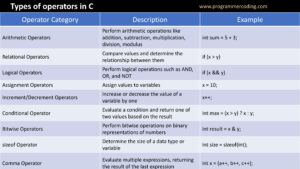Contents
- 0.0.1 What is Operators in C?
- 0.0.1.1 There Are Many Types Of Operators in C
- 0.0.1.2 Examples
- 0.0.1.3 Output
- 0.0.1.4 Examples (1)
- 0.0.1.5 Example (2)
- 0.0.1.6 Output
- 0.0.1.7 Examples (1)
- 0.0.1.8 Example (2)
- 0.0.1.9 Output
- 0.0.1.10 Examples (1)
- 0.0.1.11 Example (2)
- 0.0.1.12 Output
- 0.0.1.13 Examples (1)
- 0.0.1.14 Example (2)
- 0.0.1.15 Output
- 0.0.1.16 Examples (1)
- 0.0.1.17 Example (2)
- 0.0.1.18 Output
- 0.0.1.19 Examples (1)
- 0.0.1.20 Example (2)
- 0.0.1.21 Output
- 0.0.1.22 Examples (1)
- 0.0.1.23 Example (2)
- 0.0.1.24 Output
- 0.0.1.25 Examples (1)
- 0.0.1.26 Example (2)
- 0.0.1.27 Output
- 0.0.1 What is Operators in C?
- 1 Precedence of operators in C
What is Operators in C?
Operators in C are symbols that operate on operators. They are used to manipulate data and perform many functions in C functions.
There Are Many Types Of Operators in C

- Arithmetic Operators:
Arithmetic operators are used to perform mathematical operations consisting of addition, subtraction, multiplication, division, and modulus.
Examples
#include <stdio.h>
int main() {
int a = 10, b = 5;
int sum = a + b; // 15
int difference = a – b; // 5
int product = a * b; // 50
int quotient = a / b; // 2
int remainder = a % b; // 0
printf(“Sum: %d\n”, sum);
printf(“Difference: %d\n”, difference);
printf(“Product: %d\n”, product);
printf(“Quotient: %d\n”, quotient);
printf(“Remainder: %d\n”, remainder);
return 0;
}
Output
Sum: 15
Difference: 5
Product: 50
Quotient: 2
Remainder: 0
- Relational Operators:
Relational operators are used to compare the relationship between two operands. They return either true (1) or false (0).
Examples (1)
== (equal to), != (not equal to), > (greater than), < (less than), >= (greater than or equal to), <= (less than or equal to)
Example (2)
#include <stdio.h>
int main() {
int x = 10, y = 5;
if (x > y) {
printf(“x is greater than y\n”); // x is greater than y
}
if (x == y) {
printf(“x is equal to y\n”);
}
return 0;
}
Output
x is greater than y
- Logical Operators:
Logical operators are used to perform logical operations on boolean operands. They are typically used in conditional statements and loops.
Examples (1)
&& (logical AND), || (logical OR), ! (logical NOT)
Example (2)
#include <stdio.h>
int main() {
int p = 1, q = 0;
if (p && q) {
printf(“Both p and q are true\n”);
}
if (p || q) {
printf(“At least one of p or q is true\n”); // At least one of p or q is true
}
return 0;
}
Output
At least one of p or q is true
- Assignment Operators:
The Assignment operator is used to assign values to variables. They work while providing benefits.
Examples (1)
= (simple assignment), += (addition assignment), -= (subtraction assignment), *= (multiplication assignment), /= (division assignment), %= (modulus assignment)
Example (2)
#include <stdio.h>
int main() {
int x = 10;
x += 5; // Equivalent to x = x + 5
printf(“x: %d\n”, x); // x: 15
return 0;
}
Output
x: 15
- Increment and Decrement Operators:
The increment (++) and decrement (–) operators increase or decrease the value of the variable by 1.
Examples (1)
++ (increment), — (decrement)
Example (2)
#include <stdio.h>
int main() {
int count = 0;
count++;
printf(“Count: %d\n”, count); // Count: 1
return 0;
}
Output
Count: 1
- Bitwise Operators:
Bitwise operators perform operations on individual bits of operands.
Examples (1)
& (bitwise AND), | (bitwise OR), ^ (bitwise XOR), ~ (bitwise NOT), << (left shift), >> (right shift)
Example (2)
#include <stdio.h>
int main() {
int a = 5, b = 3;
int result_and = a & b; // Bitwise AND
int result_or = a | b; // Bitwise OR
int result_xor = a ^ b; // Bitwise XOR
printf(“Bitwise AND Result: %d\n”, result_and); // Bitwise AND Result: 1
printf(“Bitwise OR Result: %d\n”, result_or); // Bitwise OR Result: 7
printf(“Bitwise XOR Result: %d\n”, result_xor); // Bitwise XOR Result: 6
return 0;
}
Output
Bitwise AND Result: 1
Bitwise OR Result: 7
Bitwise XOR Result: 6
- Conditional Operator (Ternary Operator):
The conditional operator (?:) is used to evaluate a condition and return one of two values depending on whether the condition is true or false.
Examples (1)
(condition) ? value1 : value2
Example (2)
#include <stdio.h>
int main() {
int x = 10, y = 5;
int max = (x > y) ? x : y; // max will be assigned the value of x if x > y, otherwise y
printf(“Maximum: %d\n”, max); // Maximum: 10
return 0;
}
Output
Maximum: 10
- sizeof Operator:
The sizeof operator returns the size of a data type or variable in bytes.
Examples (1)
sizeof(int)
Example (2)
#include <stdio.h>
int main() {
int size = sizeof(int);
printf(“Size of int: %d\n”, size); // Size of int: 4 (assuming int is 4 bytes)
return 0;
}
Output
Size of int: 4
- Comma Operator:
The comma operator (,) is used to split expressions and compare them from left to right.
Examples (1)
expression1, expression2
Example (2)
#include <stdio.h>
int main() {
int a = 1, b = 2, c = 3;
int value = (a++, b++, c++); // value will be assigned the value of c (3)
printf(“Value after comma operator: %d\n”, value); // Value after comma operator: 3
return 0;
}
Output
Value after comma operator: 3
Precedence of operators in C

